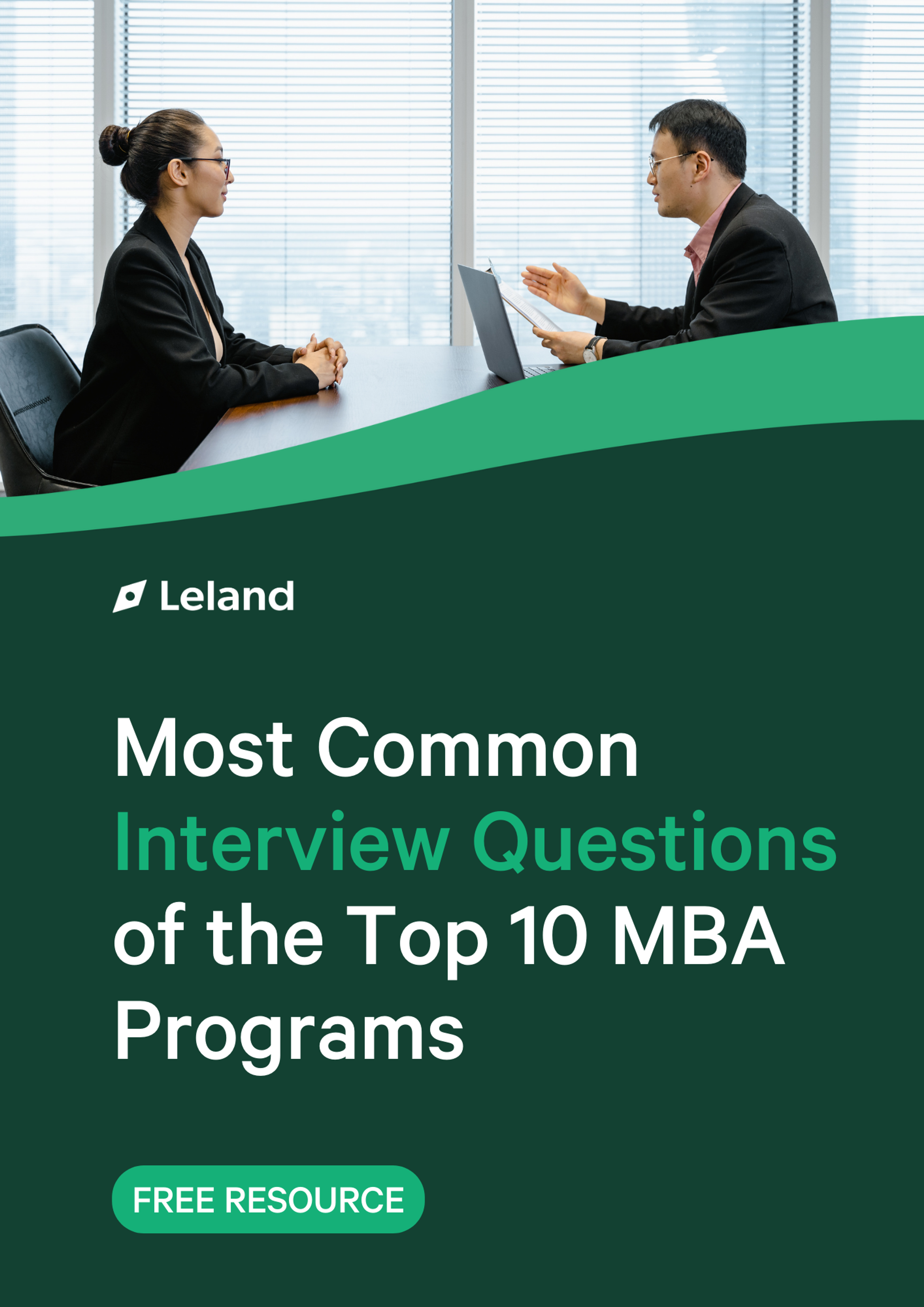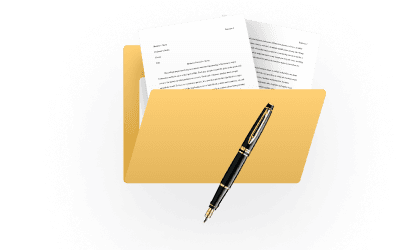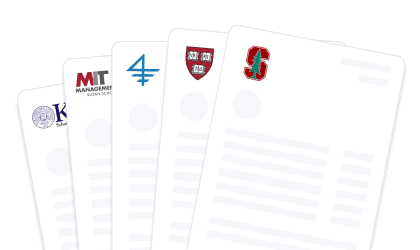Top 20 Questions to Ask During Your MBA Application Interview
Master your MBA interview with expert-curated MBA interview questions, prep tips, and insights to help you stand out and show you're ready for b-school.

By Becky S.
150+ M7/T15 Admits | Narratives That Get Interviews | Wharton Adcom Fellow
Posted October 7, 2025

Join a free event
Learn from top coaches and industry experts in live, interactive sessions you can join for free.
Table of Contents
If you plan to apply to or attend business school, you must be prepared for the MBA interview. A strong interview can significantly impact your candidacy, influencing the committee’s perception beyond your written application. It's your chance to sit in front of a real human and explain your background, your story, and your goals.
For this reason, having genuine, intelligent, and relevant questions prepared ahead of time is very important if you want to ace this portion of the admissions process. Well-researched and meaningful questions not only demonstrate your interest, intellect, and preparation but also help you engage in a more dynamic and impactful conversation with your interviewer.
I am an MBA admissions consultant and career coach with 15+ years of experience helping candidates gain admission to top business schools. I have successfully mentored 200+ MBA applicants, guiding them to admission at the best programs in the world, like Harvard Business School, Stanford GSB, Wharton, MIT Sloan, and Columbia Business School.
Before we dive into recommendations on questions, it's important to know what to expect when you walk into the room for your interview. While all top MBA programs include an interview component, the format, question style, and interviewer vary significantly across schools. Some schools extend interviews to nearly all applicants, while others reserve them for the most promising candidates. Let's break this down.
Why Great Questions Matter (Beyond Showing You’re Prepared)
Your MBA interview isn’t just a testing ground; it’s your chance to assess fit, build rapport, and reveal your career goals, values, and ambitions in context. Well-chosen questions show the interviewer that you’ve done your homework, that you’re thinking critically about business school, and that you intend to make the most of MBA programs.
Plus: when you ask smart questions, you subtly shift some control in the conversation, making it more of a dialogue than a grilling session.
From interviews across top programs and insights shared on r/MBA:
- “You can ask them, what did you love the most? What surprised you the most? What do you wish you could repeat?”
- “First off, make sure you can nail the most common questions… then build a table of stories by theme (e.g. conflict, failure, leadership)”
These threads show that many applicants regret not having deeper, follow‑up, or differentiated questions ready. We’ll cover those below.
Tactical MBA Interview Prep Framework
| Step | What to Do | Why It Matters | Expert Tip or Example |
|---|---|---|---|
| 1. Research deeply | Go beyond what’s on the school’s website by exploring recent curriculum changes, new faculty hires, or pilot initiatives within the program. | This demonstrates intellectual curiosity and signals that you’ve done meaningful research. It shows you're invested in finding the right fit, not just applying broadly. | “Ask them, based on what you’ve shared of your goals, what advice they have. Also, ask how curricular areas have evolved.” |
| 2. Tailor by interviewer type | Match your questions to the specific type of interviewer you’re speaking with. Ask admissions officers about program strategy, curriculum structure, or student selection. Ask alumni or current students about the lived experience, student culture, and lessons learned. Ask second-year students about day-to-day workload, club involvement, and how they balanced internship recruiting. | This shows emotional intelligence and social awareness: two traits that MBA programs look for. It also helps you get more honest, useful insights from each conversation. | “I asked my alumni interviewer about their favorite class and what they’d skip if they could redo it. That sparked a 10-minute conversation.” |
| 3. Avoid yes/no or easily Googled questions | Don’t ask anything that has a simple, factual answer on the school’s website or in their marketing materials. Avoid yes/no phrasing like, “Do you have international students?” or “Is there a consulting club?” | These kinds of questions make you seem underprepared or unoriginal. They waste valuable interview time and can hurt the impression you leave. | Instead of asking “Do you have global electives?”, ask “Which global immersion experiences have students found most valuable for career exploration?” |
| 4. Prioritize two to three high-impact questions | Choose a small number of meaningful questions that reflect your real goals, interests, or decision-making criteria. They should help you learn something you can’t find elsewhere and drive a deeper conversation. | It’s better to ask two thoughtful questions that lead to a meaningful dialogue than to fire off five generic ones. The quality of your questions reflects your self-awareness and preparation. | A strong structure is to ask one question related to your career goals, one about the student experience, and one that helps assess program fit. |
| 5. Bring one or two backup questions | Prepare a couple of extra questions you can use in case the conversation ends early or your main questions are answered naturally during the discussion. | Having backup questions shows that you're prepared, thoughtful, and able to adapt in real time. It also prevents awkward silence at the end of the interview. | If you have time, a great closing question might be: “What kind of student do you think gets the most out of this graduate degree program?” |
20 Common MBA Interview Questions to Ask (Grouped by Interviewer Type)
Here are 2 high-leverage interview questions to ask. Use them, adapt them, and deliver them to deepen conversation.
Questions to Ask an Alumni or Current Student
These questions tap into lived experience and culture: areas that most admissions sites can’t fully capture.
- What surprised you most about your experience in this program? (People often answer the things they wish they’d known in advance.)
- What do you wish you had done differently during your time here?
- How active is the alumni network in your field (e.g. consulting, VC, operations)? (Important for networking opportunities)
- How have your career goals shifted since you enrolled? Did the program’s resources support that shift?
- How accessible are faculty and advisors in day‑to‑day mentoring?
- What’s your favorite class/learning opportunity, and why?
- What’s been the biggest personal or professional challenge you faced during the program, and how did you overcome it?
- What has been your most rewarding academic experience so far, and what made it stand out?
- How has this MBA influenced your current job or post‑graduation trajectory?
Questions to Ask an Admissions Officer / AdCom
You’re testing fit, mission alignment, and how the program operates from a structural and strategic lens.
- Based on my background and goals, what courses or resources would you recommend I lean into early?
- In the last 2‑3 years, what strategic changes (classes, faculty hires, concentrations) has the program made, and where is it heading?
- Can you share feedback you have heard from recruiters about prior classes? (A subtle way to get program strengths or weaknesses)
- What traits do MBA students who succeed here typically have? (Signals the criteria you're aiming to align with)
- How does the career services/recruiting team support high‑risk or trial career goals (e.g. entrepreneurship, niche sectors)?
- How do you measure student success (short-term & long-term)?
- What is one thing you wish more applicants asked about your business school?
Questions to Ask a Panel or Group Interview (or General Use)
These are flexible and useful if you have no clue who’ll interview you, or if multiple people are involved.
- What do you think are the program’s biggest advantages relative to peer MBA programs?
- In your experience, what’s been the toughest part of balancing coursework, recruiting, and personal life here?
- What kind of person thrives in this program, and what kind of person struggles?
- Looking forward: what changes or innovations are you most excited about in this graduate degree program over the next 5 years?
How to Make These Questions Work (in Real Time)
Here’s how you shift from passive “listening” to strategic “conversation builder”:
- Listen for unexpected cues. If your interviewer mentions a new initiative or a challenge, you can follow up mid‑interview (“You mentioned [X], could you tell me more about how the program supports students there?”).
- Pivot based on interview type. If it’s a blind interview, you can ask more open, foundational questions. If it’s non-blind, reference an essay or point from your application (“You saw my essay on social impact. How do students here build that out?”).
- Push deeper rather than broad. If the interviewer gives a superficial answer, follow up with “Why?” or “What’s one example of that in action?”
- Don’t force questions. If the interview naturally covers one of your questions, skip it and go to the backup.
- Close strong. If you get 1–2 minutes at the end, ask your punchiest question (e.g. #11, #17, or #20 above) so the interview ends on you as thoughtful and forward-facing
Interview Formats of the M7 MBA Programs
There are several important distinctions in interview formats between schools. The biggest differences to be aware of include:
| Dimension | What It Means | Expert Context and Strategic Implications |
|---|---|---|
| In-person vs. Virtual | MBA interviews may be conducted either virtually or in person, depending on the school and round. Post-COVID, most schools have adopted virtual formats, while some offer optional in-person interviews in global business hubs or on campus. | Virtual interviews are now standard at many top programs, but in-person interviews can offer more nuanced opportunities to connect, read body language, and demonstrate interest. If you choose in-person, plan for the logistical challenges and time commitment. If virtual, ensure your setup and delivery are polished: lighting, background, and sound all matter. |
| Interviewer Type | Interviews may be conducted by admissions officers, alumni, or current students, each with a different perspective and evaluation style. | Interviews with admissions officers tend to be more formal and evaluative, with a strong focus on institutional fit, values, and admissions criteria. Alumni interviewers bring a practitioner’s perspective and often assess alignment with the program’s long-term value and network. Current students offer a peer lens, often focusing on your potential contributions to the class, clubs, and community. Tailor your questions and tone accordingly. |
| Blind vs. Non-Blind | In blind interviews, the interviewer has only seen your resume. In non-blind interviews, the interviewer has reviewed your full application, including essays, recommendations, and academic records. | Blind interviews require strong storytelling and the ability to reintroduce your background from scratch. Use this format to guide the narrative intentionally and highlight your most relevant experiences. Non-blind interviews may probe more deeply into specific themes or inconsistencies in your application. Review your submitted materials beforehand so you can speak to every detail with confidence and consistency. |
| Invite-Only vs. Open Interview Policy | Some programs interview all applicants (open interview policy), while others extend interviews selectively (invite-only), often based on initial application strength. | Invite-only interviews are a strong signal of interest; being invited means you’ve cleared an initial screen and are considered competitive. Programs like HBS and Stanford GSB typically interview about 20–25% of applicants. Open interviews, like those at Kellogg or Duke Fuqua, allow any applicant to schedule an interview before submitting the full application. These interviews still carry significant weight, and early preparation is essential. Understanding a school’s policy helps you interpret the invitation and strategize your preparation timeline. |
For the full guide on MBA interviews, check out: MBA Interviews: What to Expect, How to Prepare, and How to Stand Out
Stanford GSB
The GSB interviews only a select number of applicants, usually two to three people for every one spot in the class, so being extended an invitation to interview is a positive sign, but not a guarantee. The interview is heavily behavioral, emphasizing past experiences to gauge leadership, decision-making, and values. Expect deep dives into specific instances of professional and community impact.
Interviews are conducted by alumni or admissions officers, offering applicants a firsthand glimpse into the program’s culture and expectations. Candidates should be prepared to articulate their most meaningful experiences and how they align with Stanford’s mission.
- Interviewer: Alumni or MBA admissions officer
- Format: Virtual or in-person
- Length: 45-60 minutes
- Timeline: Late September to late November (Round 1), mid-January to mid-March (Round 2), and late April to mid-May (Round 3)
Read: How to Nail Your Stanford GSB MBA Interview: Overview, Questions, & Tips
See: Top 10 MBA Admissions Consultants for Stanford GSB
Harvard Business School
Harvard Business School (HBS) maintains a selective interview process, inviting approximately 20-25% of applicants. A distinctive aspect of HBS's process is the mandatory "post-interview reflection," which candidates must submit within 24 hours of their interview. Interviewers at HBS, typically admissions board members, conduct comprehensive reviews of each applicant's entire application to tailor the conversation to the individual's experiences and aspirations. This approach allows the school to gain deeper insights into each candidate's fit with HBS's values and culture.
- Interviewer: Admissions board member
- Format: In-person (in a major city), Zoom, or on-campus
- Length: 30 minutes
- Timeline: October (Round 1), late January to early March (Round 2)
Read: How to Ace Your HBS MBA Interview
Explore: Top 10 MBA Consultants for Harvard Business School
University of Chicago Booth
The University of Chicago Booth School of Business invites approximately 50% of applicants to interview, indicating serious consideration of their applications. Common interview questions reported by past candidates include:
- "Why are you pursuing an MBA?"
- "Why did you choose Booth?"
- "Can you tell me about yourself?"
- "How would you describe your leadership style?"
- Interviewer: Current student, graduate, or admissions staff member
- Format: On-campus, in-person, or virtual
- Length: 30-45 minutes (including about 10 minutes for Q&A)
- Timeline: Mid-October to early November (Round 1), end of January to February (Round 2), mid-April to mid-June (Round 3)
Read: How to Answer the “Why Booth?” Interview Question
See: Top 10 MBA Consultants for Chicago Booth
University of Pennsylvania Wharton
The Wharton School at the University of Pennsylvania employs a distinctive interview format known as the Team-Based Discussion (TBD). Invited applicants, approximately 40% of the pool, participate in a group discussion with four to five peers, collaboratively addressing a provided prompt to develop a solution. This format assesses candidates' teamwork, communication, and problem-solving abilities. Following the TBD, each applicant engages in a brief, ten-minute one-on-one interview with a member of the admissions committee to reflect on the group interaction and discuss individual motivations.
- Interviewer: 4-5 other applicants and then a member of the admissions committee
- Format: Virtual
- Length: 45 minutes
- Timeline: Late October (Round 1), mid-February (Round 2), mid-April (Round 3)
Read our full article on Wharton’s interview here: Wharton Interview Guide: The Team-Based Discussion
Also, see: Top 10 MBA Consultants for Wharton

Northwestern University Kellogg
At Northwestern University's Kellogg School of Management, interviews are conducted in a "blind" format, where interviewers have access only to the applicant's resume, not the full application. This approach encourages candidates to share and elaborate on personal and professional experiences that motivated their pursuit of an MBA at Kellogg. Notably, Kellogg strives to offer interviews to all applicants, underscoring the school's commitment to holistic evaluation.
- Interviewer: Current student, alumni, or MBA admissions officers
- Format: Virtual
- Length: 30-45 minutes
- Timeline: Applicants schedule their own interviews within six weeks of the application deadline
For more Kellogg interview tips, read: How to Nail Your Kellogg MBA Interview: Overview, Questions, & Tips
Explore: Top 10 MBA Consultants for Northwestern Kellogg
Columbia Business School
At Columbia Business School (CBS), interviews are also conducted in a "blind" manner, with interviewers reviewing only the applicant's resume. CBS extends interview invitations selectively, making an invitation a positive indicator of interest, though it does not guarantee admission. Uniquely, CBS does not mandate interviews for all applicants; some may be admitted without an interview.
- Interviewer: Usually an alumnus, occasionally an MBA admissions officer or current student
- Format: In-person or virtual
- Length: 45-60 minutes
- Timeline: Variable, within six weeks of submitting the application
Read: Ace Your Columbia Business School MBA Interview: Expert Tips and Sample Questions
Explore: Top 10 MBA Consultants for Columbia Business School
Massachusetts Institute of Technology Sloan
The Massachusetts Institute of Technology's Sloan School of Management utilizes a "Behavioral Event-Based Interview" format, concentrating on candidates' past actions and decision-making processes rather than hypothetical scenarios. Interviewers delve deeply into specific experiences, often with extensive follow-up questions, resulting in fewer distinct questions compared to other programs. Approximately 20-25% of applicants receive interview invitations, reflecting Sloan's selective approach.
- Interviewer: Admissions committee member
- Format: Virtual
- Length: 30-45 minutes
- Timeline: Invitations are sent on a rolling basis until the decision deadline
For more expert advice on the MIT interview, read our article How to Nail Your MIT Sloan MBA Interview: Overview, Questions, & Tips
See: Top 10 MBA Consultants for MIT Sloan

Most Common Interview Questions of the Top 10 MBA Programs
Download our free guide to the most common MBA interview questions to be as prepared as possible to nail your interview
Expert MBA Interview Tips: How to Prepare Like a Top Applicant
Top-tier MBA programs use the interview to go beyond your application. It’s a test of self-awareness, communication, and fit. Whether you’re interviewing with an admissions officer, a second-year student, or a seasoned MBA graduate, how you prepare will determine your outcome.
This is not just about rehearsing great answers. It’s about how you analyze your experience, connect your career goals to the program, and ask smart, authentic questions, especially in a high-stakes conversation.
Here’s how to get it right and stand out.
Structure Your Stories with Precision
Strong candidates walk into the interview with 6–8 personal examples they can adapt to any question, including situational MBA interview questions like “Tell me about a time you faced a negative situation at work”, “Describe a moment when you had to change careers or switch paths” and “Share a time when you used your resources wisely to solve a problem”
Use the STAR framework (Situation, Task, Action, Result) to structure each story. This method ensures your responses are grounded, relevant, and show impact, especially when asked about leadership, failure, teamwork, or ethical challenges within the business world.
Expert Insight: Many schools will expect you to tie these stories to what you hope to do next, so practice bridging past experiences with your future goals in the business field.
Match Your Prep to Your Interviewer
Your strategy should shift depending on who’s conducting your interview. This is one of the most overlooked parts of interview prep.
- Admissions officers are trained evaluators. Focus on how your values and leadership style align with the school’s mission and learning model in business administration.
- Alumni will often test for cultural fit, real-world readiness, and how you’ll use the degree in your current position or future roles. Ask them how they’ve used their master's degree post-graduation.
- Current students care about how you’ll contribute. Ask about program work, clubs, and their decision-making process. What helped them build relationships or develop relationships across different backgrounds?
Expert Tip: Personalize your questions to their experience. If you're interviewing with someone in product management, for instance, ask how the program prepared them for the transition or how it compared to doing other degree.
Show Genuine Enthusiasm (and That You've Done Your Homework)
Top programs from b-schools like HBS and Wharton to MIT Sloan and Booth admit candidates who show a real desire to be part of their specific community. Go into your interview understanding not just the rankings, but how the program operates day-to-day.
Don’t say you love the case method. Say, “I’m excited by how the case studies in X class focus on [industry] challenges. That aligns directly with the pivot I want to make into [new path].”
Also, demonstrate that you’ve thought about life after the MBA. This includes how you’ll use the school’s resources to explore new fields, build networks, or change careers intentionally.
Admissions committees notice when you’ve been to an admissions event, connected with alumni, or referenced something specific from the curriculum or a professor. These details signal deep engagement and high intent.
Demonstrate Emotional Maturity
Beyond polished answers, great interviews show maturity. You don’t need to be perfect; you need to be real, self-aware, and reflective.
Here’s what that looks like:
- Self-awareness - Own your strengths and weaknesses with humility. Talk about feedback you’ve received and how it shaped your growth.
- Empathy - Discuss moments when you considered others’ perspectives, especially in team or cross-functional environments. Business schools value collaboration more than bravado.
- Resilience - Share how you rebounded from setbacks, whether it was a failed project, a tough leadership moment, or a risky decision in your current position.
Many interviewers are listening for more than intellect. They’re asking: “Would I want this person in my learning team?” Show that you bring perspective, not just credentials.
Ask Smart, Specific, and Personal Questions
Asking thoughtful questions shows you’re not just selling yourself, but you’re making a decision. You’re choosing which graduate degree program will help you reach your goals.
Avoid asking yes/no questions or anything that can be found on the website. Instead, ask about the things only insiders know:
- “How do second-years typically use their electives to specialize or shift industries?”
- “What’s one course that shaped how you think about leadership or decision-making?”
- “How have you seen the school help students who come in with plans to change careers?”
Your questions should also reflect your genuine curiosity. If you want to work in fintech, ask about how students break into the space. If you’re aiming to develop relationships in new geographies, ask how international treks or global consulting projects facilitate that.
Expert Tip: Tailor your questions to show how the program fits your unique background. If you previously pursued another degree, mention how that experience shapes what you're seeking from the MBA.
Final MBA Interview Prep Checklist
Use this checklist to give yourself a tactical edge going into your interview, whether it's with an AdCom member, alum, or current student. These steps are what consistently set successful applicants apart.
| Checklist Item | Why It Matters | Expert-Level Guidance |
|---|---|---|
| Memorize 2–3 “anchor stories” | Interviewers want to hear evidence of leadership, adaptability, and self-awareness, not just potential. | Prepare go-to stories about leadership, adversity, and teamwork. Make sure each one reflects your values and aligns with your post-MBA goals. Structure them using the STAR method: Situation, Task, Action, Result. |
| Practice out loud, not just in your head | Rehearsing in real-time improves delivery, clarity, and confidence, especially under pressure. | Practice with a coach, a trusted friend, or record yourself. Reddit and GMAT Club applicants often report that repetition until fluency is the best way to eliminate filler words, awkward pauses, and rambling. |
| Prepare for “edge cases” and uncommon prompts | Behavioral interviews at top programs like MIT Sloan or Stanford GSB often explore ethical reasoning, emotional resilience, and cross-cultural fluency. | Have examples ready for high-stakes challenges like ethical dilemmas, interpersonal conflict, or major failures. Think about how you used your values or leadership instincts to navigate each one. |
| Demonstrate emotional intelligence | Beyond polished answers, programs want emotionally mature leaders who know how to listen, reflect, and collaborate. | Speak with calm confidence. Acknowledge weaknesses without defensiveness. Highlight how you support others, grow from feedback, and lead with empathy, especially in team or high-stress settings. |
| Treat it as a two-way conversation | Top MBA interviews are not interrogations; they’re mutual evaluations. Your questions shape the tone and help you assess fit. | Ask thoughtful, tailored questions that show you’ve researched the school deeply. Use the interview to test how the program supports your interests, career transitions, and learning preferences. This is your final chance to ensure this is the right investment for you. |
Becky S. is an expert MBA admissions consultant and career coach with over 15 years of experience helping candidates get into top programs like HBS, Stanford GSB, Wharton, MIT Sloan, and more.
A Wharton MBA herself, Becky offers personalized, strategic guidance across the entire admissions and recruiting journey — from crafting a standout application to landing your dream internship or job. Her coaching methodology is highly customized to each applicant’s strengths and goals. She specializes in application strategy, interview preparation, and career transitions, ensuring every client presents a compelling narrative that resonates with admissions committees. Book a free intro call with Becky and take the next step toward acing your MBA interview.
Also, see: Top 10 MBA Consultants for Interviews and Top 10 MBA Consultants for Resumes
Next, read:
- Six Coaches' Best Advice for the MBA Interview
- How to Build a Lasting Connection in Your MBA Interview
- How to Nail Your Virtual MBA Interview
- MBA Application Deadlines of the Top 25 Business Schools
- How to Accelerate Your MBA Application – From an Expert Coach
FAQs for MBA Program Interview Questions
What is the purpose of an MBA interview?
- The MBA interview is a crucial part of the application process that allows the school to assess your fit for their program. It also provides you with an opportunity to learn more about the program and determine if it aligns with your career goals and personal aspirations.
How should I prepare for my MBA interview?
- Prepare by researching the school's program thoroughly, understanding its unique offerings, and reflecting on your experiences and goals. Practice answering common interview questions using a structured approach like STAR (Situation, Task, Action, Result), and prepare thoughtful questions to ask your interviewer.
What types of questions should I ask an alumni interviewer?
- Ask questions that help you understand the alumni's personal experience, the culture of the program, and the long-term benefits of the MBA. Focus on gaining insights into their career progression, networking opportunities, and any advice they have for new students.
What types of questions should I ask an admissions committee member?
- Focus on questions that give you a deeper understanding of the program's curriculum, support systems, and evaluation criteria. Inquire about resources for your specific career interests, the program's unique courses, and how the school supports entrepreneurial initiatives and career placements.
How can I tailor my questions for different interviewers?
- For alumni interviewers, focus on personal experiences and outcomes. For admissions committee members, ask about the program's structure, resources, and how it aligns with your career goals. For current MBA students, focus on their experience at the program thus far. Make sure to tailor your questions to the interviewer's perspective to get the most relevant information.

Written by Becky
5.0
(35)
Hi! I am Becky Song - an expert admissions consultant and professional career coach with over 15 years of experience supporting students and candidates through their admissions and career development journeys. Over the past decade, I have successfully mentored 250+ college and MBA applicants, empowering them to achieve their full academic potential by gaining admission to their dream programs. I provide personalized and comprehensive guidance to help my students navigate the complex college admissions process with confidence and success. For college admissions, my students have earned spots at many of the top institutions in the US, such as Harvard, Columbia, MIT, Stanford, UPenn, UC Berkeley, JHU, Duke, Vanderbilt, CMU, NYU, etc. For MBA admissions, my clients have earned spots at many of the top programs in the US, such as HBS, Stanford GSB, Wharton, MIT Sloan, Columbia, Kellogg, Booth and other T15 and T20 schools. I believe every candidate has a unique and compelling story to tell, and I am dedicated to helping them craft an engaging narrative and build a personal brand that resonates with admissions committees and differentiates them from other applicants. As a recruiting coach and career consultant, I have coached 100+ candidates, helping them boost their chances of successfully secure management consulting and strategy related roles at their dream companies in a competitive job market. Whether you're a student looking for an internship, a fresh graduate from college or graduate school looking for your first job, a MBA candidate looking to make a career transition or a seasoned professional who's looking for their next big move, you've come to the right place! I hold an MBA degree from The Wharton School of the University of Pennsylvania, specializing in Entrepreneurship & Innovation and Finance, and a BA from Vanderbilt University, where I was a recipient of the prestigious full-tuition Chancellor’s Scholarship. Personally, I have made many successful transitions in my career, from actuary to non-profit leader, strategy consultant to entrepreneur. I have a diverse background in various industries, including consulting, government, healthcare and education. As an experienced management consultant and manager who has led many teams at various top consulting firms, I have served a wide range of federal government and Fortune 500 clients in the healthcare, retail, CPG, and technology industries. Whether you need guidance on application strategy, resume review, or interview preparation, I'm here to help you achieve your academic and professional dreams. I am excited to learn more about you and look forward to supporting you every step of the way. Reach out today to jump start your new journey!
Becky has helped clients get into organizations like:
Browse hundreds of expert coaches
Leland coaches have helped thousands of people achieve their goals. A dedicated mentor can make all the difference.

























